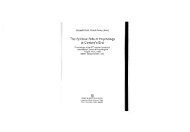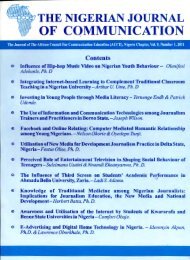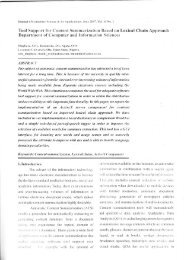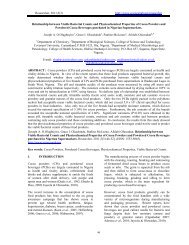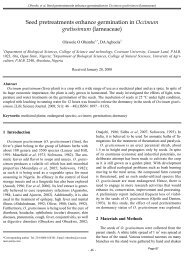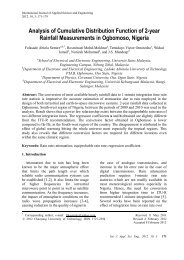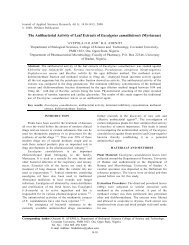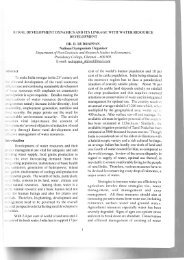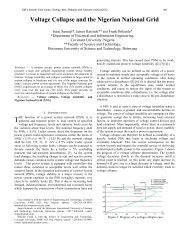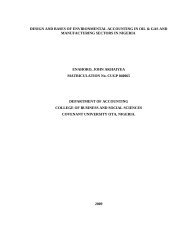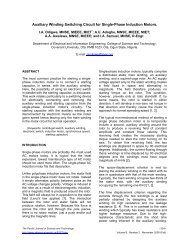Download (8Mb) - Covenant University Repository
Download (8Mb) - Covenant University Repository
Download (8Mb) - Covenant University Repository
Create successful ePaper yourself
Turn your PDF publications into a flip-book with our unique Google optimized e-Paper software.
217<br />
serfs; in capitalist societies, employers exploit their employees. The family is orten a<br />
management ofconflict between a man and his wife or his wives or his extcnded family<br />
relations depending on the society in question. Conflict theory, therefore, covers a wide<br />
range ofsociological problems in most African societies each with its own diversities<br />
ofsocial cultural systems. Conflict involves struggle between segments ofsociety over<br />
valued resources. The Marxian approach to gender stratification centres on the extent<br />
to which women's access to the control of the forces of production detern1ines their<br />
relative position in society. For this variant ofMarxian tneory, women's oppression i,s<br />
traceable to class domination and subjugation.<br />
What is evident, therefore, is that in rural Nigeria, the relationship between men<br />
and women is based on gender inequality due to its patriarchal structure. Here, women<br />
are discriminated against in terms of land ownership because of their sex which<br />
ultimatcly affects women's agricultural production. The situation has also creatcd a<br />
lack of equity and social justice in tern1S of access, owneFship and control of land<br />
especially tor agricultural purpose which is a rcfleetion oCthe dictates ofthe culture to<br />
the neglect of the women who actually engage more in food crop production. In<br />
addition, how much access to land a woman enjoys depends on her relationship with<br />
the man, either as a wife, a relation, as a widow who has access to land due to the<br />
magnanimity of her in-laws or if she holds the land in tl1Jst for her male children,<br />
pending when they are old enough to take possession oftheir inheritance.<br />
African FeministTheory<br />
Feminism examines the position ofwomen in society and tries to further their interests.<br />
In general terms, feminism asserts that sex ,is a fundamental and irreducible axis of<br />
social organization that, to date has subordinated women to men. This structural<br />
subordination of women has been described by feminists as patriarchy with its<br />
derivative meanings of the male-headed family, mastery and superiority (Barker,<br />
2004).<br />
Igenozah (2004) has also observed that the concern with the gender question<br />
is primarily on the secondary standing of women in society. Feminists sec the<br />
secondary standing of women in the scheme of things as a fonn of victimization,<br />
especially the subordinate role women are made to play in relation to men. According<br />
to Heldke and O'Connor (2004), the emphasis ofthe feminist theory is on oppression,<br />
discrimination, injustice and exploitation. They stated that ifoppression systematically<br />
and unfairly marginalizes some members. of a socicty, then it must also grant othcr<br />
members of that society an unfair adv.antage. Culture is the place where inequality is<br />
reproduccd, but it is within culture that gender is fonned (Baldwin et aI, 2004).<br />
According to Hara!ambos and Holborn (2008), there are different versions of<br />
feminism, but most share some common features. Like Marxists, feminists tend to sec<br />
society as divided into different sociaL groups. Unlike Marxists, they sce the major<br />
division as being between men and women rather than betwecn different classes. Like<br />
Marxists, they tend to see society as characterized by exploitation. Unlike Marxists,<br />
they sec the exploitation of women by men as the most important source of<br />
exploitation, rather than that of the working class by the ruling class. Many feminists<br />
characterize contemporary socicties as patriarchal, that is they arc dominated by men.<br />
Some feminist writers, however, disagree that all women are equally<br />
oppressed and disadvantaged in contemporary socicties. They believe that it is



